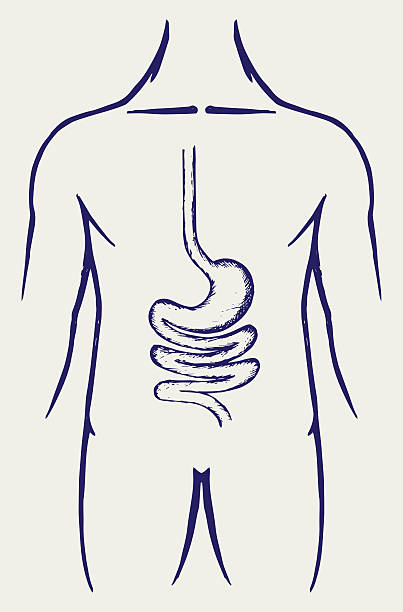
Human digestive system. Doodle style
Adelekan Oluwaseun Ojo
Stomach troubles or Gastritis is a medical condition characterized by inflammation of the stomach lining. It can be acute (sudden and short-term) or chronic (long-lasting). The condition can range from mild irritation to severe inflammation and can lead to more serious complications if left untreated, such as ulcers or stomach bleeding.
Understanding the causes, symptoms, diagnosis, and treatment options is essential for managing gastritis effectively.
Causes.
Several factors can contribute to this development including:
1. Infection: The most common cause of stomach troubles or gastritis is infection with Helicobacter pylori (H. pylori) bacteria. This bacteria can weaken the protective stomach lining, allowing digestive acids to cause inflammation.
2. Medications: Overuse of non-steroidal anti-inflammatory drugs (NSAIDs) like ibuprofen or aspirin can damage the stomach lining, leading to gastritis.
3. Excessive Alcohol Consumption: Alcohol irritates and erodes the stomach lining, making it more susceptible to inflammation.
4. Stress: Physical or emotional stress, especially from surgery, injury, or severe illness, can trigger acute gastritis.
5. Autoimmune Disorders: In some cases, the body’s immune system mistakenly attacks the stomach lining, causing inflammation. This is known as autoimmune gastritis.
6. Other Causes: Other factors such as smoking, excessive caffeine intake, and bile reflux (where bile flows into the stomach) can also lead to gastritis.
Symptoms.
Symptoms of gastritis vary depending on the severity of the condition. Some people may experience no symptoms at all, while others may have:
a. Abdominal Pain: This is the most common symptom, usually felt in the upper part of the stomach. It can be sharp or burning.
b. Nausea and Vomiting: Inflammation of the stomach lining can cause feelings of nausea, and in severe cases, vomiting.
c. Indigestion: This may cause a feeling of fullness after eating only a small amount of food, along with bloating and discomfort.
d. Loss of Appetite: Many people may lose their appetite due to the discomfort it causes.
e. Hiccups or Belching: Recurrent belching or hiccups can occur as a result of stomach irritation.
f. Vomiting Blood or Blood in Stool: In severe cases, it may cause bleeding in the stomach, leading to blood in vomit (which may look like coffee grounds) or in the stool (which may appear black or tarry).
Diagnosis.
If stomach troubles or gastritis is suspected, doctors may use several methods to confirm the diagnosis:
1.Medical History and Physical Exam: A detailed medical history, including symptoms, medication use, and lifestyle factors, is usually the first step.
2. Blood Tests: Blood tests may be conducted to check for the presence of H. pylori or to assess for anemia (a common side effect of chronic gastritis).
3. Stool Tests: Stool tests can be used to detect H. pylori or blood in the stool, which may indicate stomach bleeding.
4. Breath Test: A urea breath test can detect H. pylori infection. The patient swallows a substance containing urea, and if H. pylori is present, the bacteria break it down into carbon dioxide, which is detected in the breath.
5. Endoscopy: In more severe or chronic cases, an upper gastrointestinal endoscopy may be done. A small camera on the end of a flexible tube is inserted through the mouth and into the stomach to examine the stomach lining for inflammation or ulcers.
Treatments.
Treatment for gastritis depends on its cause, but most cases are manageable with lifestyle changes and medications. Common treatment options include:
A. Medications
– Antibiotics: If H. pylori infection is the cause, a course of antibiotics may be prescribed to eradicate the bacteria.
– Proton Pump Inhibitors (PPIs): These drugs reduce stomach acid production, giving the stomach lining time to heal.
– Antacids: Over-the-counter antacids can neutralize stomach acid and relieve symptoms of gastritis.
– H2 Blockers: These medications reduce acid production in the stomach.
B. Lifestyle Changes
– Dietary Adjustments: Avoiding spicy, acidic, or fried foods that can irritate the stomach lining is essential. A diet rich in fruits, vegetables, and whole grains is beneficial.
– Limit Alcohol and Caffeine: Reducing alcohol and caffeine intake can help prevent irritation of the stomach lining.
– Quit Smoking: Smoking increases stomach acid and weakens the stomach lining.
– Stress Management: Techniques such as yoga, meditation, and exercise can help reduce stress, which may exacerbate gastritis symptoms.
C. Treating Underlying Conditions:
For autoimmune stomach troubles, treatment focuses on managing the immune response and addressing nutrient deficiencies, such as vitamin B12 deficiency, which often accompanies this condition.
Prevention .
While it may not always be possible to prevent stomach problems but certain lifestyle changes can significantly reduce the risk:
a. Eat smaller, more frequent meals to avoid overloading the stomach.
b.Avoid excessive alcohol consumption and smoking.
c.Use NSAIDs cautiously, and avoid long-term use if possible.
d. Manage stress through relaxation techniques and physical activity.
USE OF JIGSIMUR HERBAL DRINK
The use of Jigsimur herbal drink is a good option to treat Gastritis or stomach troubles because of its potential to clear off infections from the entire body system. Also, it boosts the immune and reduces the acid, to create good time for the stomach to heal. Jigsimur also provides the body with phyto nutrients needed, addressing nutrients deficiency which accompanies this condition. This is also an anti-stressor, and wipes off all traces of stress, takes care of indigestion and Hiccups or Belching. Also, it neutralizes the effect of drug overuse which has become toxic to the system. Jigsimur is a recommendable natural medicine to take care of this health condition perfectly.
Preventive Use: It is advisable to take Jigsimur as a living human being, to prevent any occurrence of major or minor health issues. It’s a good preventive measure against all forms of infections affecting the body.
Stomach troubles or gastrics is a common condition that can cause discomfort and lead to more serious complications if left untreated. However, with early diagnosis, lifestyle adjustments, and appropriate medical treatment, most people can manage their symptoms and prevent further damage to the stomach lining. If you experience persistent abdominal pain or other signs of gastritis, it’s important to seek medical advice for proper diagnosis and treatment.
……………Adelekan Oluwaseun Ojo, is a counseling psychologist, and a business & health consultant with Jigsimur Zdex Int’l, a company which is into the production and distribution of Jigsimur herbal health drink, a natural curative and preventive herbal medicine from South Africa.
For personal consultation, you can contact us on 07089225319 or 08035122399




